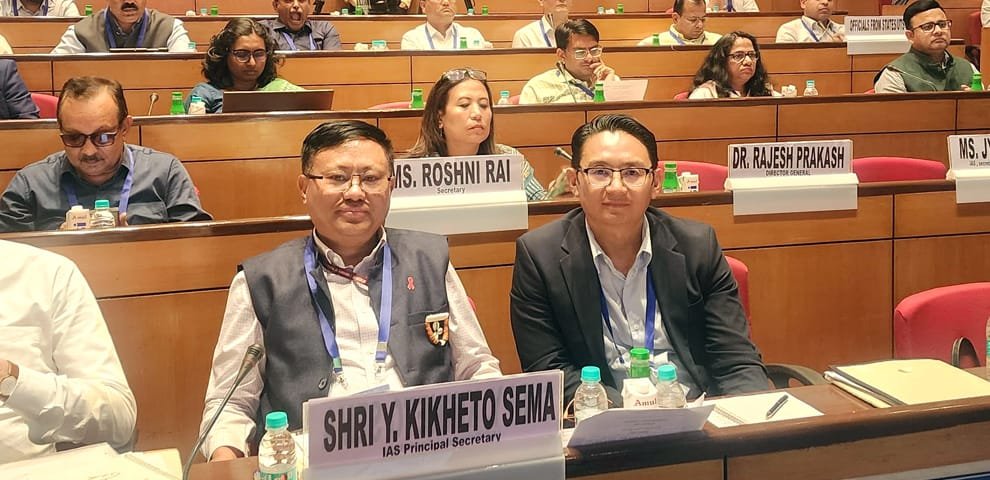In a pivotal move for Nagaland’s fisheries sector, Y. Kikheto Sema, IAS, the state’s Principal Secretary for Fisheries & Aquatic Resources, recently urged significant policy overhauls in fisheries funding and infrastructure. His call came during the Fisheries Secretaries Conference 2025 and the National Workshop on Harnessing Technology and Innovation in Aquaculture, held in New Delhi on May 23rd.
Key Demands for Revised PMMSY Guidelines
Y. Kikheto Sema specifically addressed the upcoming Pradhan Mantri Matsya Sampada Yojana (PMMSY) guidelines, highlighting critical issues impacting Nagaland and the broader North East region:
Increased Funding Norms: The current PMMSY funding of ₹8.40 lakh per hectare is drastically insufficient. Sema advocated for an increase to ₹25 lakh per hectare, aligning with the latest NPWD Schedule of Rates. This revision is crucial for viable fisheries development in Nagaland.
Reintroduction of Renovation Provisions: Given the North East’s susceptibility to natural disasters like floods and landslides, Sema stressed the need to reintroduce provisions for renovation and reclamation of old ponds and water bodies. These vital components, present in earlier schemes, are missing from the current PMMSY.
Integrated Cluster Approach: To boost rural productivity and marketability, he proposed an integrated cluster approach for agricultural and allied sectors, promoting Agro-Aqua-Eco-Tourism in Nagaland.
Inclusion of Administrative & Contingency Costs: Unlike other central flagship schemes, PMMSY lacks provisions for administrative and contingency costs, hindering effective implementation and monitoring in states like Nagaland. Sema pressed for their inclusion.
Revised Funding Ratio: The current 60:40 (Centre: State) funding ratio poses a significant burden on small and marginal fish farmers. Sema proposed a more favourable 90:10 or 80:20 model, consistent with other central schemes for the Northeast and hilly states, to ensure greater accessibility for Nagaland’s fish farmers.
Modern Fish Market in Dimapur: Citing the dilapidated condition of existing facilities, Sema requested the establishment of a modern, hygienic fish market in Dimapur, a key hub for Nagaland’s fishing industry.
Bank Support for Fishery Initiatives: Sema appealed to the Centre to direct banks and financial institutions to actively support PMMSY beneficiaries, including farmers, entrepreneurs, and cooperatives, addressing the current reluctance of banks to finance fishery-based projects in Nagaland.
In response, Dr. Abhilash Likhi, IAS, Union Secretary for Fisheries, Ministry of Fisheries, Animal Husbandry & Dairying, assured that Nagaland’s concerns would be thoroughly considered during the revision of the PMMSY guidelines.
Y. Kikheto Sema was accompanied by Neitho-o Kuotsu, Joint Director, Fisheries & Aquatic Resources, Nagaland, underscoring the collaborative effort to advance sustainable fisheries in Nagaland.
The impassioned plea by Principal Secretary Y. Kikheto Sema at the recent Fisheries Secretaries Conference underscores a critical juncture for Nagaland’s aquatic resources. His detailed recommendations for the upcoming PMMSY guidelines are not merely regional demands; they represent a vital blueprint for unlocking the full potential of fisheries in the Northeast, ensuring both economic prosperity and ecological resilience. The current funding disparities, the glaring absence of renovation provisions crucial for disaster-prone areas, and the challenging Centre-State funding ratio are all significant hurdles that, if unaddressed, will continue to stifle growth and innovation.
Furthermore, Sema’s vision extends beyond mere subsidies, advocating for an integrated cluster approach that could revolutionize rural productivity by intertwining agriculture, aquaculture, and eco-tourism. The push for a modern fish market in Dimapur and stronger bank support for fishery initiatives highlights a holistic understanding of the sector’s needs, from production to market access and financial inclusion. Dr. Abhilash Likhi’s assurance to consider these concerns during the revised PMMSY guidelines offers a glimmer of hope. The ball is now in the Centre’s court to translate these critical insights into actionable policies that truly empower Nagaland’s fish farmers and contribute to a more vibrant and sustainable national fisheries landscape. The collaborative spirit demonstrated by Sema and Joint Director Neitho-o Kuotsu in presenting these demands serves as a powerful reminder that the future of Nagaland’s fisheries hinges on proactive policy reform and sustained support.

